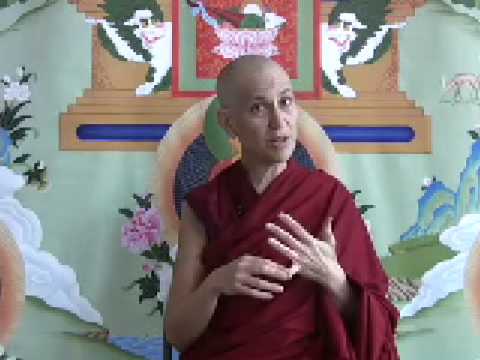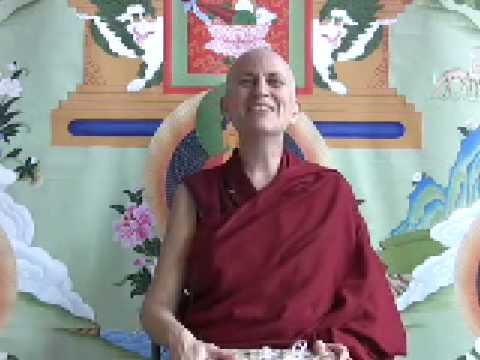Verse 36-1: Praising others
Part of a series of talks on the 41 Prayers to Cultivate Bodhicitta from the Avatamsaka Sutra (the Flower Ornament Sutra).
- Praising sentient beings and the buddhas and bodhisattvas
- Practicing both refuge and bodhicitta
- The difficulties we face in praising sentient beings
41 Prayers to cultivate bodhicitta: Verse 36-1 (download)
“May all beings praise the qualities of all Buddhas and bodhisattvas.”
This is the prayer of the bodhisattva when seeing someone praise another.
Very nice. May we all think of others and ourselves praising the buddhas and bodhisattvas when we see somebody praising somebody else. This is talking about praising two different objects. One is praising sentient beings, and the other is praising buddhas and bodhisattvas. We have to do both. According to different people, one may be harder than the other. Some people find praising sentient beings very easy but when it comes to buddhas and bodhisattvas they feel like they are to far away. They don’t know what to say. Other people, when they think of the qualities of the buddhas and bodhisattvas, they’re very inspired and find the praise comes easily, but when they think of sentient beings they go, “Blah!”
This why we practice both refuge and bodhicitta, because in order to take refuge we have to see the good qualities of the holy beings and in order to practice bodhicitta we have to see the good qualities of sentient beings. We need both of those, not just one and not just the other. There are some people, because there are four points between, some people find it easy to praise both. Some people find it difficult to praise both. Let’s look at this one at a time.
If we look at sentient beings: do we find it easy or difficult to praise sentient beings? Well, of course the sentient beings we like, who agree with us, that’s no problem, but even with them some times, do we make it a practice of pointing out other peoples good qualities. Or do we just expect their good qualities and point out when they don’t meet our expectations. Which is it? In many ways we just expect people to act at a certain way. We don’t think to comment on it except when they don’t do it. But actually part of our bodhisattva practice is to point out the qualities of others and praise others. It’s one of the auxiliary bodhisattva precepts to praise others.
It’s actually a very good training practice for us to try everyday to say something good about somebody else. Not just the people we like, but practice it. Of course, yes, praise the people we like. But also practice it regarding people we don’t know so well and train our minds to point out their good qualities. Also practice seeing the good qualities of the people that we’re envious of, the people who treat us badly, the people who we don’t like. It’s a practice we have to deal with, isn’t it? How are we going to have love and compassion for all sentient beings if we can’t see them as having good qualities? You have to see them as having some good qualities and be appreciative to them in some way, in order to have love and compassion.
Training our mind in this way is very important and needless to say when we get good at it, it makes our mind much happier and we get along better with other people. But at the beginning it feels like you are pulling your teeth out. Admit somebody else is good?! Even if they’re good, not even saying that they are better then me, just that they are good. So often the critical mind comes actually from our own low self-esteem. Let’s practice praising others.
Venerable Thubten Chodron
Venerable Chodron emphasizes the practical application of Buddha’s teachings in our daily lives and is especially skilled at explaining them in ways easily understood and practiced by Westerners. She is well known for her warm, humorous, and lucid teachings. She was ordained as a Buddhist nun in 1977 by Kyabje Ling Rinpoche in Dharamsala, India, and in 1986 she received bhikshuni (full) ordination in Taiwan. Read her full bio.


